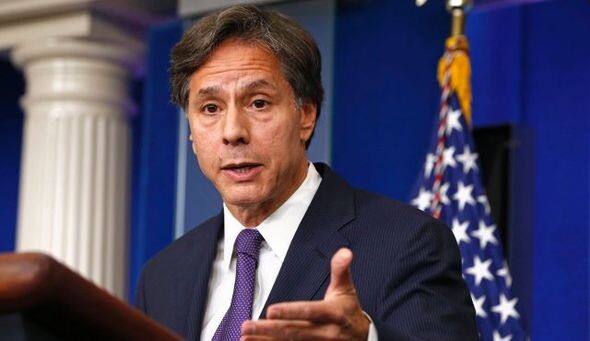hankyoreh
Links to other country sites 다른 나라 사이트 링크
US official speaks on necessity of cooperation with S. Korea and Japan

A high-ranking US official delivered a public talk on the necessity and vision of trilateral cooperation with South Korea and Japan.
The speech came ahead of a trilateral summit scheduled on Mar. 31 to coincide with the upcoming Nuclear Security Summit in Washington, DC. The message could be a sign that the US government is getting set to pursue trilateral diplomatic and military cooperation in earnest now that the “obstacle” of the Japanese military comfort women issue has been cleared by an agreement on it by Seoul and Tokyo late last year.
Speaking at the Brookings Institution on Mar. 29, US Deputy Secretary of State Tony Blinken noted that South Korean President Park Geun-hye and Japanese Prime Minister Shinzo Abe had “forged a historic agreement on the sensitive issue of comfort women.”
“Their courageous statecraft has . . . opened the door to greater bilateral and trilateral collaboration,” he continued.
Blinken went to on to say the three sides should “articulate a vision for long-term trilateral cooperation that proves its centrality to the defense of our shared interests and preservation of our shared ideals.”
As a first step, he mentioned “building a trilateral relationship that is strategic in value.” The term “strategic value” has typically been used in the past to refer to cooperation on military and security matters.
Indeed, Blinken also said the three sides “share a common purpose in addressing the region‘s most acute threat: North Korea.”
“We will continue to increase the costs on North Korea until it comes into compliance with its international obligations,” he pledged.
Blinken also said the North Korean nuclear issue would be a key topic on the agenda at the upcoming trilateral summit.
Meanwhile, US State Department spokesperson John Kirby voiced Washington’s position in response to a question on Japan’s recent security legislation at a briefing the same day.
“We welcome Japan’s ongoing efforts to strengthen the alliance and to play a more active role in regional and international security activities,” Kirby said.
The remarks could indicate that the three sides will step up their military and security cooperation - a process grounded in a greater military role for Japan in response to the North Korean threat.
Blinken further discussed the need for the three sides to play an important role in forming constructive relationships among members of ASEAN and other Asian countries and emphasized cooperation at the global level to combat climate change, extremism, and hacking. The content of his talk stood in sharp contrast with the tenor from Washington as recently as the South Korea-Japan agreement on Dec. 28, when it addressed the issue of trilateral cooperation more gingerly in response to public opinion in South Korea.
Blinken also responded to questions about the possible deployment of a Terminal High Altitude Area Defense (THAAD) system on the Korean Peninsula.
“We know that China does not like it,” Blinken admitted of THAAD, before saying that North Korea’s continued provocative behavior and nuclear and missile program development was increasing the urgency and importance of taking necessary measures for the security of the US and its friends and allies.
Beijing was quick to voice its objections.
“THAAD goes beyond the normal demands of protecting the Korean Peninsula,” said Chinese Foreign Ministry spokesperson Hong Lei in a Mar. 30 briefing. “It threatens China’s legitimate state security interests and destroys strategic stability in the region.”
By Yi Yong-in, Washington correspondent
Please direct questions or comments to [english@hani.co.kr]

Editorial・opinion
![[Guest essay] Maybe Korea’s rapid population decline is an opportunity, not a crisis [Guest essay] Maybe Korea’s rapid population decline is an opportunity, not a crisis](https://flexible.img.hani.co.kr/flexible/normal/500/300/imgdb/original/2024/0430/9417144634983596.jpg) [Guest essay] Maybe Korea’s rapid population decline is an opportunity, not a crisis
[Guest essay] Maybe Korea’s rapid population decline is an opportunity, not a crisis![[Column] Can Yoon steer diplomacy with Russia, China back on track? [Column] Can Yoon steer diplomacy with Russia, China back on track?](https://flexible.img.hani.co.kr/flexible/normal/500/300/imgdb/original/2024/0430/1617144616798244.jpg) [Column] Can Yoon steer diplomacy with Russia, China back on track?
[Column] Can Yoon steer diplomacy with Russia, China back on track?- [Column] Season 2 of special prosecutor probe may be coming to Korea soon
- [Column] Park Geun-hye déjà vu in Yoon Suk-yeol
- [Editorial] New weight of N. Korea’s nuclear threats makes dialogue all the more urgent
- [Guest essay] The real reason Korea’s new right wants to dub Rhee a founding father
- [Column] ‘Choson’: Is it time we start referring to N. Korea in its own terms?
- [Editorial] Japan’s rewriting of history with Korea has gone too far
- [Column] The president’s questionable capacity for dialogue
- [Column] Are chaebol firms just pizza pies for families to divvy up as they please?
Most viewed articles
- 1‘We must say no’: Seoul defense chief on Korean, USFK involvement in hypothetical Taiwan crisis
- 2After election rout, Yoon’s left with 3 choices for dealing with the opposition
- 3Why Kim Jong-un is scrapping the term ‘Day of the Sun’ and toning down fanfare for predecessors
- 4Two factors that’ll decide if Korea’s economy keeps on its upward trend
- 5Noting shared ‘values,’ Korea hints at passport-free travel with Japan
- 6AI is catching up with humans at a ‘shocking’ rate
- 7[Correspondent’s column] The US and the end of Japanese pacifism
- 8A week of protests lays bare many inherent vices of Korean health care system
- 9[Editorial] As it bolsters its alliance with US, Japan must be accountable for past
- 10[Editorial] Japan’s rewriting of history with Korea has gone too far